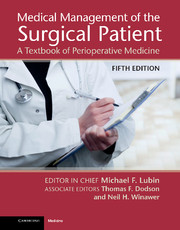Book contents
- Frontmatter
- Dedication
- Contents
- List of Contributors
- Preface
- Introduction
- Part 1 Perioperative Care of the Surgical Patient
- Section 1 General
- Section 2 Cardiology
- Section 3 Hypertension
- Section 4 Pulmonary
- Section 5 Gastroenterology
- Section 6 Hematology
- Section 7 Infectious disease
- Section 8 Renal disease
- Section 9 Endocrinology
- Section 10 Rheumatology
- Section 11 Neurology
- Chapter 35 Cerebrovascular disease
- Chapter 36 Management of the surgical patient with dementia
- Chapter 37 Neuromuscular disorders
- Chapter 38 Perioperative management of patients with Parkinson's disease
- Chapter 39 Delirium in the surgical patient
- Section 12 Surgery in the Elderly
- Section 13 Obesity
- Section 14 Transplantation
- Section 15 Psychiatric Disorders
- Section 16 Peripartum Patients
- Part 2 Surgical Procedures and their Complications
- Index
- References
Chapter 36 - Management of the surgical patient with dementia
from Section 11 - Neurology
Published online by Cambridge University Press: 05 September 2013
- Frontmatter
- Dedication
- Contents
- List of Contributors
- Preface
- Introduction
- Part 1 Perioperative Care of the Surgical Patient
- Section 1 General
- Section 2 Cardiology
- Section 3 Hypertension
- Section 4 Pulmonary
- Section 5 Gastroenterology
- Section 6 Hematology
- Section 7 Infectious disease
- Section 8 Renal disease
- Section 9 Endocrinology
- Section 10 Rheumatology
- Section 11 Neurology
- Chapter 35 Cerebrovascular disease
- Chapter 36 Management of the surgical patient with dementia
- Chapter 37 Neuromuscular disorders
- Chapter 38 Perioperative management of patients with Parkinson's disease
- Chapter 39 Delirium in the surgical patient
- Section 12 Surgery in the Elderly
- Section 13 Obesity
- Section 14 Transplantation
- Section 15 Psychiatric Disorders
- Section 16 Peripartum Patients
- Part 2 Surgical Procedures and their Complications
- Index
- References
Summary
Improvement in medical care and lifestyle practice has resulted in greater life expectancy for American adults. In 2008, 39 million people aged 65 and over lived in the USA, accounting for 13% of the total population. This older population grew from 3 million in 1900 to 39 million in 2008. The “oldest-old” population grew from just over 100,000 in 1900 to 5.7 million in 2008 [1].
Older adults frequently have multiple medical problems that can result in an increased need for hospitalization and utilization of healthcare expenditures. Older age, cognitive impairment, polypharmacy, and functional and sensory impairment are risk factors most likely to result in postoperative delirium [2]. Geriatric patients with dementia are at higher risk for the development of delirium. Delirium costs are $38–$152 billion dollars per year [3]. Management of the surgical dementia patient is geared toward prevention of delirium. Delirium is prevented through the identification of dementia and preoperative management of risk factors. This will improve surgical outcomes, decrease length of hospitalization, and reduce healthcare costs.
- Type
- Chapter
- Information
- Medical Management of the Surgical PatientA Textbook of Perioperative Medicine, pp. 396 - 403Publisher: Cambridge University PressPrint publication year: 2013



